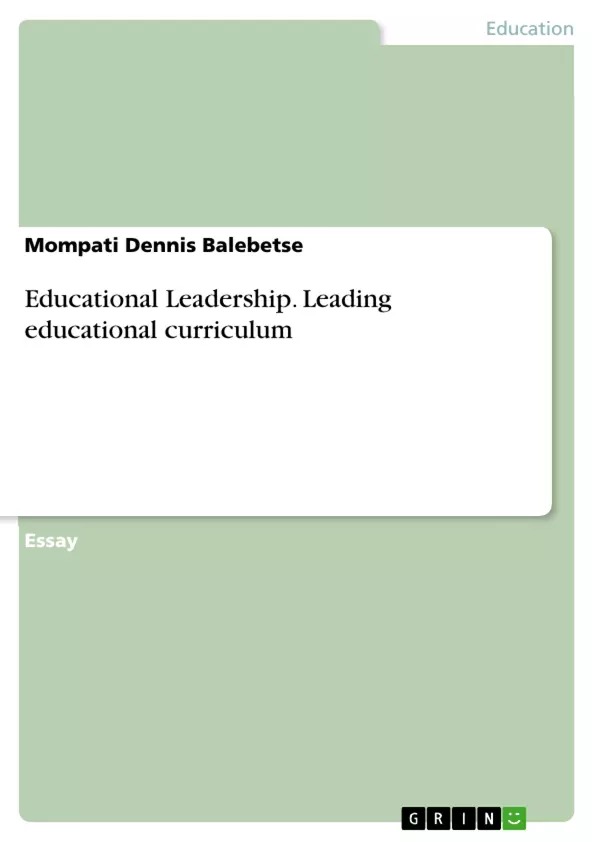I have realized that Curriculum Leadership is a complex and demanding practice, which goes beyond the research and disciplinary expertise of the curriculum leader. In this course I examined the diverse and often contentious field of curriculum studies. I have learned about curriculum theory and practice within the broader sociopolitical context, drawing upon real case studies from across the world. I was able to examine the work of educators and curriculum theorists, both past and present, which have contributed and/or continue to knowledge within the field. Through this course I was encouraged to adopt a creative viewpoint, examining key issues and past reforms efforts through new and alternative vantage point. I also gained fundamental skills and knowledge towards curriculum theory and practice with my professional environment. It is against this background that this paper reflects on the course, reflection activities will be used to show my reflections.
Inhaltsverzeichnis (Table of Contents)
- Activity: Equity for all: School reforms and the curriculum
- Activity: the everyday world: school reforms and the curriculum
- Activity: Forging a new path: The no child left behind era
- Activity: Forging a new path: The no child left behind era
- Activity: Forging a new path: The no child left behind era
- Activity: Curriculum in context: Theory and Practice
Zielsetzung und Themenschwerpunkte (Objectives and Key Themes)
This paper aims to reflect on the course "Curriculum Leadership" and showcase the author's reflections on key issues related to curriculum development and implementation within the broader sociopolitical context. The paper utilizes real case studies and examines the work of educators and curriculum theorists to provide insights into the complexities of curriculum leadership.
- The role of politics in curriculum development and decision-making
- The impact of societal changes on education and work arrangements
- The debate surrounding standardized testing and its implications for curriculum
- The importance of a shared vision and communication in implementing curriculum change
- The relationship between educational theory and practice
Zusammenfassung der Kapitel (Chapter Summaries)
- The first chapter explores the role of politics in curriculum development, highlighting the influence of government policies and the need for stakeholder involvement in decision-making.
- The second chapter examines the impact of societal changes on education and work arrangements, particularly the increasing demands for lifelong learning and individual responsibility for professional development.
- The third chapter delves into the debate surrounding standardized testing, discussing both its potential benefits and drawbacks in evaluating student achievement and its impact on curriculum flexibility.
- The fourth chapter presents the Washington City School System's vision of a curriculum of excellence, focusing on the importance of creating and communicating a shared vision when implementing change.
- The fifth chapter explores the complex relationship between educational theory and practice, examining the challenges of bridging the gap between theoretical concepts and everyday classroom realities.
Schlüsselwörter (Keywords)
This paper focuses on key concepts such as curriculum leadership, curriculum development, societal changes, standardized testing, school reforms, educational theory, educational practice, politics, stakeholder engagement, and shared vision.
Frequently Asked Questions
What is curriculum leadership?
Curriculum leadership is a complex practice that involves guiding educational theory and practice within a broader sociopolitical context.
How does politics affect school curriculum?
Politics influences curriculum development through government policies, funding, and the involvement of various stakeholders in decision-making.
What are the challenges of standardized testing?
Standardized testing is debated for its impact on curriculum flexibility and its ability to accurately evaluate diverse student achievements.
Why is a shared vision important for school reform?
A shared vision ensures that all educators and stakeholders work towards the same goals, improving communication and the success of implementation.
What is the relationship between educational theory and practice?
The text explores the difficulty of bridging the gap between theoretical concepts and the everyday realities of the classroom.
- Quote paper
- Mompati Dennis Balebetse (Author), 2020, Educational Leadership. Leading educational curriculum, Munich, GRIN Verlag, https://www.grin.com/document/997402



